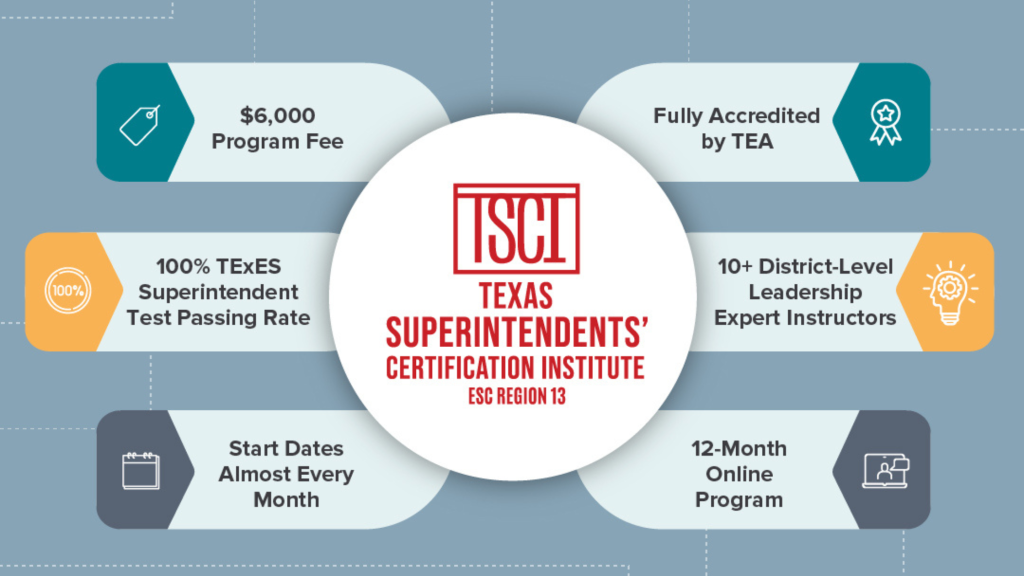If you’re an aspiring educational leader, considering a superintendent certification program is a significant step toward advancing your career. A superintendent plays a crucial role in shaping the educational landscape and guiding schools and districts toward achieving their goals. Here’s an overview of what you can expect from a typical alternative certification program in Texas, with specific insights into the Texas Superintendents’ Certification Institute (TSCI).
Curriculum Overview
A superintendent certification program is designed to provide future superintendents with the necessary knowledge, skills, and mindsets for effective leadership. The curriculum covers a wide range of topics aligned with the Texas Superintendent Certification standards and the TExES (195) exam domains and competencies.
- Leadership of the Educational Community
- Demonstrate integrity, fairness, and ethical behavior to ensure the success of all students.
- Develop, articulate, implement, and maintain a shared vision of learning supported by the educational community.
- Communicate and collaborate with families and community members, address diverse community interests and needs, and mobilize community resources to ensure the educational success of all students.
- Respond to and influence the broader political, social, economic, legal, and cultural context, including collaborating with the board of trustees, to achieve the district’s educational vision.
- Instructional Leadership:
- Facilitate strategic planning and implementation to enhance teaching and learning, ensure alignment of curriculum and assessments, utilize the current accountability system, and promote diverse assessments to measure student performance.
- Advocate, promote, and sustain an instructional program and a district culture that are conducive to student learning and staff professional growth.
- Implement a staff evaluation and development system, selecting suitable supervision and staff development models to enhance the performance of all staff members.
- Administrative Leadership
- Apply effective leadership and management principles in district budgeting, personnel, resource utilization, financial management, and technology applications.
- Utilize leadership and management principles in the district’s physical plant and support systems to ensure a safe and effective learning environment.
- Use organizational, decision-making, and problem-solving skills to comply with federal and state requirements and facilitate positive change in various contexts.
Duration and Requirements
The duration of a superintendent certification program can vary, but most programs range from one to two years.
Typical Alternative Superintendent Certification Requirements Include:
- Prerequisites:
- A master’s degree from an accredited university.
- Valid administrative certification or its equivalent.
- Professional experience in educational leadership roles.
- If you have proven managerial experience but lack an official principal certificate, you can submit a Superintendent Certificate Application as a substitute, pending approval.
- Coursework and Exams
- Complete all certification program requirements. This includes all coursework, training, internship hours, and state certification.
- Pass the TExES Superintendent (195) exam.
- Certification
- You must be recommended by your certification program for standard certification.
- Apply and pay for a superintendent certificate.
- You can access your certificate with your TEAL login.
Already hold your Master’s Degree? Learn more about the Texas Superintendents’ Certification Institute– an online preparation program with a start date every few months!
Specific Insights into TSCI
The Texas Superintendents’ Certification Institute (TSCI) offers a robust and comprehensive superintendent certification program tailored to meet the needs of aspiring superintendents and district-level leaders in Texas. Here are some key highlights:

- Online Learning:
- TSCI provides a convenient online format, allowing participants to integrate their learning into their daily professional leadership roles. This flexibility is especially beneficial for working professionals balancing their professional commitments with their educational pursuits.
- Expert Instructors:
- The program features experienced district leaders who bring practical insights and real-world experiences into the classroom. Participants benefit from their mentorship and guidance throughout the program and beyond.
- Cohort-Based Learning:
- TSCI emphasizes a collaborative learning environment where participants can engage with peers, share experiences, and build a professional network. This cohort-based approach fosters a supportive community and enhances the learning experience.
- Comprehensive Curriculum:
- The TSCI curriculum is aligned with Texas state standards and covers essential topics such as educational leadership, school finance, legal issues, and community engagement. This ensures that graduates are well-prepared to meet the challenges of the superintendent role.
- Field-Based Experiences:
- Participants can gain hands-on experience through internships and practicums in partnering school districts. These field-based experiences are integral to developing practical skills and understanding the complexities of district leadership.
- Application Deadlines and Start Dates:
- TSCI offers start dates almost every month. Interested candidates should start their application process early to secure their spot in the program.
Conclusion
A superintendent certification program is critical for educators aspiring to lead school districts and drive educational success. Programs like the Texas Superintendents’ Certification Institute offer comprehensive training, flexible learning options, and valuable field experiences to prepare future superintendents for their roles. By understanding the curriculum, duration, and requirements, aspiring leaders can make informed decisions about their professional development and career advancement.
Sarah is the Coordinator of Administrator Quality here at ESC Region 13.





Add comment